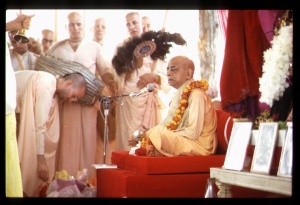SB 9.22.14-15: Difference between revisions
m (1 revision(s)) |
No edit summary |
||
| Line 1: | Line 1: | ||
{{info | {{info | ||
|speaker= | |speaker=Śukadeva Gosvāmī | ||
|listener=King | |listener=King Parīkṣit | ||
}} | }} | ||
[[Category:Srimad-Bhagavatam - Canto 09 Chapter 22]] | |||
[[Category:Bhagavatam Verses Spoken by Sukadeva Gosvami - Vanisource|092214]] | |||
<div style="float:left">'''[[Srimad-Bhagavatam]] - [[SB 9|Ninth Canto]] - [[SB 9|Ninth Canto]] - [[SB 9.22: The Descendants of Ajamidha|Chapter 22: The Descendants of Ajamīḍha]]'''</div> | |||
<div style="float:right">[[File:Go-previous.png|link=SB 9.22.12-13]] '''[[SB 9.22.12-13]] - [[SB 9.22.16-17]]''' [[File:Go-next.png|link=SB 9.22.16-17]]</div> | |||
{{RandomImage}} | |||
==== TEXTS 14-15 ==== | ==== TEXTS 14-15 ==== | ||
<div | <div class="verse"> | ||
śāntim āpnoti caivāgryāṁ | :śāntim āpnoti caivāgryāṁ | ||
karmaṇā tena śāntanuḥ | :karmaṇā tena śāntanuḥ | ||
samā dvādaśa tad-rājye | :samā dvādaśa tad-rājye | ||
na vavarṣa yadā vibhuḥ | :na vavarṣa yadā vibhuḥ | ||
śāntanur brāhmaṇair uktaḥ | |||
parivettāyam agrabhuk | :śāntanur brāhmaṇair uktaḥ | ||
rājyaṁ dehy agrajāyāśu | :parivettāyam agrabhuk | ||
pura-rāṣṭra-vivṛddhaye | :rājyaṁ dehy agrajāyāśu | ||
:pura-rāṣṭra-vivṛddhaye | |||
</div> | </div> | ||
| Line 21: | Line 27: | ||
==== SYNONYMS ==== | ==== SYNONYMS ==== | ||
<div | <div class="synonyms"> | ||
''śāntim''—youthfulness for sense gratification; ''āpnoti''—one gets; ''ca''—also; ''eva''—indeed; ''agryām''—principally; ''karmaṇā''—by the touch of his hand; ''tena''—because of this; ''śāntanuḥ''—known as Śāntanu; ''samāḥ''—years; ''dvādaśa''—twelve; ''tat-rājye''—in his kingdom; ''na''—not; ''vavarṣa''—sent rain; ''yadā''—when; ''vibhuḥ''—the controller of the rain, namely the King of heaven, Indra; ''śāntanuḥ''—Śāntanu; ''brāhmaṇaiḥ''—by the learned ''brāhmaṇas''; ''uktaḥ''—when advised; ''parivettā''—faulty because of being a usurper; ''ayam''—this; ''agra-bhuk''—enjoying in spite of your elder brother's being present; ''rājyam''—the kingdom; ''dehi''—give; ''agrajāya''—to your elder brother; ''āśu''—immediately; ''pura-rāṣṭra''—of your home and the kingdom; ''vivṛddhaye''—for elevation. | |||
</div> | </div> | ||
| Line 28: | Line 34: | ||
==== TRANSLATION ==== | ==== TRANSLATION ==== | ||
<div | <div class="translation"> | ||
Because the King was able to make everyone happy for sense gratification, primarily by the touch of his hand, his name was Śāntanu. Once, when there was no rainfall in the kingdom for twelve years and the King consulted his learned brahminical advisors, they said, "You are faulty for enjoying the property of your elder brother. For the elevation of your kingdom and home, you should return the kingdom to him." | Because the King was able to make everyone happy for sense gratification, primarily by the touch of his hand, his name was Śāntanu. Once, when there was no rainfall in the kingdom for twelve years and the King consulted his learned brahminical advisors, they said, "You are faulty for enjoying the property of your elder brother. For the elevation of your kingdom and home, you should return the kingdom to him." | ||
</div> | </div> | ||
| Line 35: | Line 41: | ||
==== PURPORT ==== | ==== PURPORT ==== | ||
<div | <div class="purport"> | ||
One cannot enjoy sovereignty or perform an agnihotra-yajña in the presence of one's elder brother, or else one becomes a usurper, known as parivettā. | One cannot enjoy sovereignty or perform an ''agnihotra-yajña'' in the presence of one's elder brother, or else one becomes a usurper, known as ''parivettā''. | ||
</div> | </div> | ||
__NOTOC__ | |||
<div style="float:right; clear:both;">[[File:Go-previous.png|link=SB 9.22.12-13]] '''[[SB 9.22.12-13]] - [[SB 9.22.16-17]]''' [[File:Go-next.png|link=SB 9.22.16-17]]</div> | |||
__NOTOC__ | |||
__NOEDITSECTION__ | |||
Revision as of 11:12, 17 May 2021

A.C. Bhaktivedanta Swami Prabhupada
TEXTS 14-15
- śāntim āpnoti caivāgryāṁ
- karmaṇā tena śāntanuḥ
- samā dvādaśa tad-rājye
- na vavarṣa yadā vibhuḥ
- śāntanur brāhmaṇair uktaḥ
- parivettāyam agrabhuk
- rājyaṁ dehy agrajāyāśu
- pura-rāṣṭra-vivṛddhaye
SYNONYMS
śāntim—youthfulness for sense gratification; āpnoti—one gets; ca—also; eva—indeed; agryām—principally; karmaṇā—by the touch of his hand; tena—because of this; śāntanuḥ—known as Śāntanu; samāḥ—years; dvādaśa—twelve; tat-rājye—in his kingdom; na—not; vavarṣa—sent rain; yadā—when; vibhuḥ—the controller of the rain, namely the King of heaven, Indra; śāntanuḥ—Śāntanu; brāhmaṇaiḥ—by the learned brāhmaṇas; uktaḥ—when advised; parivettā—faulty because of being a usurper; ayam—this; agra-bhuk—enjoying in spite of your elder brother's being present; rājyam—the kingdom; dehi—give; agrajāya—to your elder brother; āśu—immediately; pura-rāṣṭra—of your home and the kingdom; vivṛddhaye—for elevation.
TRANSLATION
Because the King was able to make everyone happy for sense gratification, primarily by the touch of his hand, his name was Śāntanu. Once, when there was no rainfall in the kingdom for twelve years and the King consulted his learned brahminical advisors, they said, "You are faulty for enjoying the property of your elder brother. For the elevation of your kingdom and home, you should return the kingdom to him."
PURPORT
One cannot enjoy sovereignty or perform an agnihotra-yajña in the presence of one's elder brother, or else one becomes a usurper, known as parivettā.